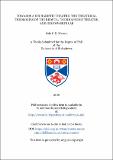Files in this item
Towards a eucharistic theatre : the theatrical theologies of the Reduta, the Rhapsodic Theatre, and Grotowski's Lab
Item metadata
| dc.contributor.advisor | Hart, Trevor A. | |
| dc.contributor.author | Matson, Cole C. E. | |
| dc.coverage.spatial | [6], 252 p. | en_US |
| dc.date.accessioned | 2017-11-06T15:17:16Z | |
| dc.date.available | 2017-11-06T15:17:16Z | |
| dc.date.issued | 2016-06-21 | |
| dc.identifier.uri | https://hdl.handle.net/10023/12006 | |
| dc.description.abstract | This thesis explores the use of eucharistic language in the theatre theories of three different mid-20th-century Polish theatre companies--the Reduta Theatre, the Rhapsodic Theatre, and the Laboratory Theatre--especially as expressed in the writings of their respective primary founders: Juliusz Osterwa, Mieczysław Kotlarczyk, and Jerzy Grotowski. The thesis also describes how the Rhapsodic and Laboratory Theatres inherited different elements of the Reduta tradition, and how those two diverging branches of the Reduta's legacy have affected contemporary theatre. In addition, the thesis examines how different 20th-century theatre theorists have related the eucharist to theatre, and evaluates the legitimacy of the claim that religious rituals such as the eucharist can and ought to be replaced by secular theatrical rituals. Special attention is paid to Carl Lavery's three views of the sacred: secular, theological, and a/theological. Alexander Schmemann's conception of the eucharist is used to correct Lavery's presentation of the theological sacred and to argue for the possibility of a Christian sacred theatre, or a "eucharistic theatre." The thesis defines the concept of a eucharistic theatre; demonstrates the extent to which the Reduta, Rhapsodic, and Laboratory Theatres meet this definition; and suggests some ways in which a eucharistic theatre may be created today. | en_US |
| dc.language.iso | en | en_US |
| dc.publisher | University of St Andrews | |
| dc.subject | Reduta Theatre | en_US |
| dc.subject | Rhapsodic Theatre | en_US |
| dc.subject | Laboratory Theatre | en_US |
| dc.subject | Juliusz Osterwa | en_US |
| dc.subject | Mieczysław Kotlarczyk | en_US |
| dc.subject | Jerzy Grotowski | en_US |
| dc.subject | Karol Wojtyła | en_US |
| dc.subject | John Paul II | en_US |
| dc.subject | Eucharist | en_US |
| dc.subject | Theatre | en_US |
| dc.subject | Eucharistic theatre | en_US |
| dc.subject | Ritual | en_US |
| dc.subject.lcc | PN2859.P6M28 | |
| dc.subject.lcsh | Theater--Religious aspects--Christianity | en |
| dc.subject.lcsh | Theater--Poland--History--20th century | en |
| dc.subject.lcsh | Reduta (Theatrical company) | en |
| dc.subject.lcsh | Teatr Rapsodyczny | |
| dc.subject.lcsh | Teatr Laboratorium "13 Rzędów" | |
| dc.title | Towards a eucharistic theatre : the theatrical theologies of the Reduta, the Rhapsodic Theatre, and Grotowski's Lab | en_US |
| dc.type | Thesis | en_US |
| dc.type.qualificationlevel | Doctoral | en_US |
| dc.type.qualificationname | PhD Doctor of Philosophy | en_US |
| dc.publisher.institution | The University of St Andrews | en_US |
| dc.identifier.doi | https://doi.org/10.17630/10023-12006 |
This item appears in the following Collection(s)
Items in the St Andrews Research Repository are protected by copyright, with all rights reserved, unless otherwise indicated.

